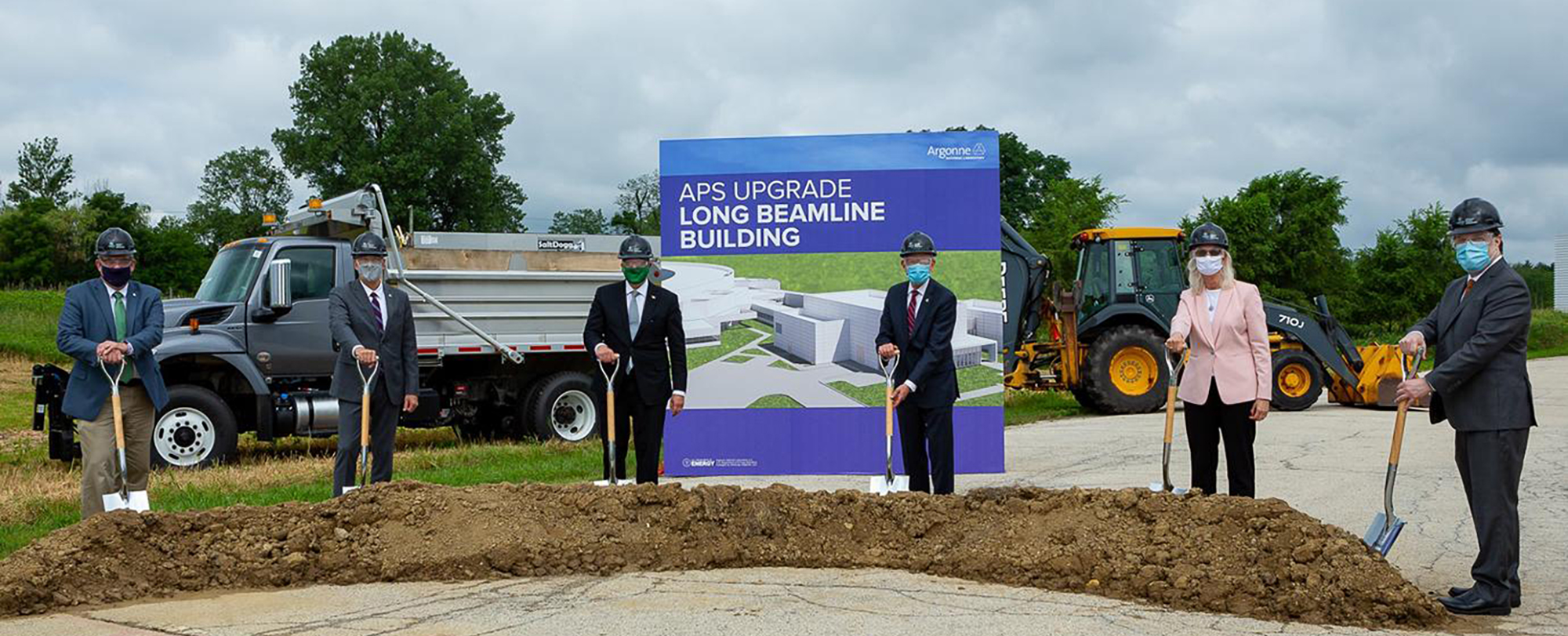
On July 22 leaders from the US Department of Energy, Argonne National Laboratory, and UChicago broke ground on the Long Beamline Building, part of the Advanced Photon Source Upgrade. (Photography by Seth Hammond / Argonne National Laboratory)
A selection of the latest headlines from across campus.
X-citement at Argonne
Leaders from the US Department of Energy, Argonne National Laboratory, and UChicago broke ground July 22 on the future of X-ray science in the United States. The small gathering marked the start of construction on an $815 million upgrade of the Advanced Photon Source (APS), which gives scientists access to high-energy, high-brightness, highly penetrating X-ray beams. Expected to be complete in 2023, the APS Upgrade will replace the already powerful electron storage ring at the heart of the facility with a state-of-the-art magnet lattice system that will increase the brightness of the X-rays generated by up to 500 times. The new facilities will also have greater capability for in situ imaging, allowing for precise measurement of the impact of temperature, pressure, and other factors on advanced materials—an important step toward creating the next generation of components for everything from aircraft engines to solar cells. The APS attracts more than 5,000 scientists from around the globe to conduct research each year.
Expanded role
On September 24 Juan de Pablo was named vice president for national laboratories, science strategy, innovation, and global initiatives. In his new role, de Pablo, Liew Family Professor of Molecular Engineering, leads the University’s science, technology, and innovation efforts, along with their connections to policy and industry. He also oversees activities at the Polsky Center for Entrepreneurship and Innovation, in close partnership with Madhav Rajan, dean of Chicago Booth. De Pablo, who was named vice president for national laboratories in 2018, continues to manage the University’s partnerships with Argonne National Laboratory and Fermilab. Alongside these duties, de Pablo is an active researcher in the field of materials science.
Economic growth
Nobel Prize–winning economist Michael Kremer joined the faculty of the Kenneth C. Griffin Department of Economics as a University Professor on September 1. He also holds an appointment at the Harris School of Public Policy. A pioneer in development economics who has shaped the discipline through the use of field experiments to inform economic models, policy, and program development, Kremer shared the Sveriges Riksbank Prize in Economic Sciences in Memory of Alfred Nobel in 2019. He was most recently the Gates Professor of Developing Societies at Harvard University. University Professors are selected for internationally recognized eminence and their potential for high impact across the University. Kremer is the 23rd person, and one of 10 active faculty members, to hold a University Professorship.
O-Week goes virtual
At this year’s Aims of Education Address, Melissa Gilliam, vice provost and the Ellen H. Block Professor of Health Justice, urged the College Class of 2024 to “start with loving yourself because the pain, fear, and uncertainty of the task ahead of us is quite daunting. Don’t beat yourself up or speak to yourself with negative words, because you are here to learn.” The encouraging speech on the challenges and opportunities of higher education was one of many Orientation Week events that went virtual this year due to COVID-19 safety measures. The prerecorded opening convocation ceremony featured many of its hallmark traditions, including welcomes from University president Robert J. Zimmer and dean of the College John W. Boyer, AM’69, PhD’75, and a bagpipe procession through Hull Gate. Throughout the week, students could meet and connect by taking part in virtual events, including a presidential debate screening, yoga, tours of UChicago museums, and improv comedy shows.
High-energy physicist
Theoretical physicist Robert Rosner was elected to the presidency of the American Physical Society (APS) in September. He will take office in 2023 as the eighth UChicago scientist to lead the organization. Rosner, the William E. Wrather Distinguished Service Professor of Astronomy and Astrophysics and Physics, works on fluid dynamics and plasma physics, as well as applied mathematics and computational physics, especially the development of modern high-performance computer simulation tools. As president of APS, Rosner hopes to increase public support for science and expand the ranks of Black and women physicists. Founded in 1899, the APS is active in public and governmental affairs, publishes multiple science journals, and conducts programs in education, public outreach, and media relations.
In the picture
A new center hosted at UChicago seeks to address the COVID-19 pandemic by curating a massive database of medical images to help better understand and treat the disease. The Medical Imaging and Data Resource Center (MIDRC) will create an open-source database with X-rays and CT scans from thousands of COVID-19 patients. Maryellen Giger, PhD’85, the A. N. Pritzker Professor of Radiology, the Committee on Medical Physics, and the College, will co-lead the MIDRC alongside an executive advisory committee that includes members of the American College of Radiology, Radiological Society of North America, and American Association of Physicists in Medicine. The center is funded by a two-year $20 million contract from the National Institute of Biomedical Imaging and Bioengineering at the National Institutes of Health.
Archival quality
The Special Collections Research Center wants your help documenting the effects of the COVID-19 pandemic. “Ten, 20 years down the road, people are going to want to see what was happening with our campuses, our students, our faculty—and just how everyone’s life got turned upside down,” says assistant University archivist Eileen Ielmini. Submissions to the archive can take the form of photographs, objects, art, creative writing, and more. Learn how to donate your own artifacts.
